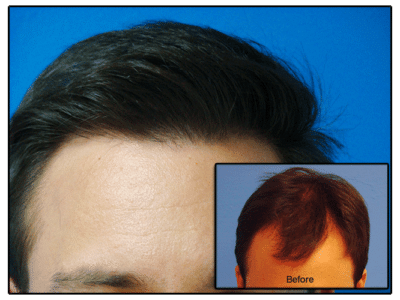If you’ve found your way to this blog, you might be experiencing hair thinning or loss and wondering if hair transplant surgery is right for you.
or loss and wondering if hair transplant surgery is right for you.
Well, you’re in the right place to get at least some of the answers you seek. Because here we discuss some factors that must be present to proceed or, on the other hand, might prevent you from moving forward with a hair transplant – at least temporarily.
The first thing worth mentioning is that there are a variety of reasons an individual might consider hair restoration, including bald spots, receding hairlines, thinning mustaches, beards, and eyebrows, and even facial or scalp scars. It’s best to consult a trusted surgeon to see what options are available for your specific hair need.
Age
While there is no age limit on hair transplants, the ideal candidate is between 25 and 65 years old. Those younger than 25 experiencing hair loss might be dealing with other health-related issues that can be resolved with medication or lifestyle changes. Patients over 65, on the other hand, tend to have significantly thinner hair and may not have enough to transplant.
Type of Hair Loss
Not all types of hair loss or thinning are the same. Those suffering from alopecia, for example, may not have hair follicles healthy enough for a successful transplant. The most suitable candidates are those experiencing pattern baldness, a condition that only affect parts of the scalp, leaving plenty of healthy donor hair for extraction.
Hair Loss Classification
There are two main factors to consider when assessing hair loss – severity and quality/quantity of donor hair available. If there is not a sufficient supply of healthy hair follicles or the amount of loss exceeds the amount of available donor hair, the transplant will likely not be successful.
Your Overall Health
Pre-surgery good health is essential to reducing the risk of complications and will help you heal more quickly. As such, patients with long-term health conditions or complications should consult their doctor before undergoing this or any other surgical procedure. Keep in mind that certain medications, such as blood thinners, may also interfere with the results and recovery time.
Expectations and Post-Procedure Care
It’s important to set realistic expectations. For example, depending on the extent of your hair loss, one procedure may not be enough. Additionally, while a hair transplant is an outpatient procedure that takes only a few hours to perform, you may not start seeing results for several months. Additionally, you must be able to commit to following your physician’s aftercare instructions to minimize discomfort, reduce the risk of infection, and reduce overall recovery time.
Are you thinking “So far, so good”? If so, then the next logical step is to contact DiStefano Hair Restoration Center to schedule a free consultation. We’ll provide plenty of information while answering all your questions – both of which are essential to make the right decision.


